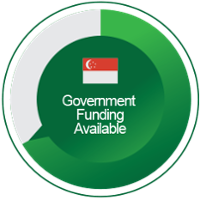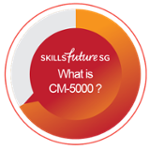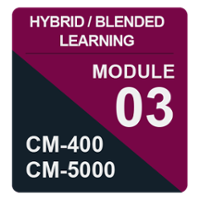This page aims to clarify any further doubts you have about attending the CM-5000 Blended Learning [BL-CM-5] or Hybrid Learning (HL) Course.
What are Blended Learning (100% Online) and Hybrid Learning (50% Online and 50% Onsite for Modules 3 and 4)?
At BCM Institute, Module 1 and Module 2, CM-300, are always conducted online or through blended learning. Participants can attend an onsite course for all our different types of training via Modules 3 and 4 only.
 Course Fees
Course Fees
What is included in the course fee?
Your course fees cover all the pre-reading materials, online facilitated discussions, assessments, and examinations attached to the course.
It also includes one re-examination at the Qualifying Crisis Management Certified Expert (CMCE) Exam in case you did not pass on the first try.
Why should I pay the same price as a "brick
and mortar" onsite course?
While the mode of delivery and the courseware have been adapted to suit virtual training, you are still getting the same value regarding standards, competency, and the level of professional instructors for the course. You would get the same instructors as you would get if you had attended the "brick and mortar" course.
![[BL-CM-5] What is a CM-5000 Blended Learning Course?](https://no-cache.hubspot.com/cta/default/3893111/ccefd4e5-12da-439f-b4dc-50cec862ebca.png) To learn more about how blended learning matches its "brick and mortar" counterpart, read: What is a CM-5000 Blended Learning Course? or click the icon on the right.
To learn more about how blended learning matches its "brick and mortar" counterpart, read: What is a CM-5000 Blended Learning Course? or click the icon on the right.
Blended Learning

Note for Singapore Participants: As BCM Institute is an Authorised Training Organisation (ATO) with the Singapore government, please scroll down to the last segment of this blog to learn more about the various course funding for Singaporeans and Singapore Permanent Residents (PR). As for Malaysia, this course is funded by the HRD Corp.
Is this a new initiative?
No, this is not a new initiative. BCM Institute has always had an e-learning platform. The COVID-19 situation just allowed us to feature the courses more prominently. This is especially true since we have been getting increasing requests for the CM-300 and CM-5000 courses to be conducted internationally.
What is so special about this course?
The CM-5000 Blended Learning is the first course aligned to the ISO standard (being published) and ISO 22361:2022 Security and Resilience — Crisis Management — Guidelines standard.
Is the course internationally recognized?
The courseware and standards are the same as our " brick-and-mortar" course, so it receives the same recognition as its face-to-face counterpart.
What is blended learning? What type(s) of learning does it comprise?
 Blended learning is a course BCM Institute offers that combines e-learning, online facilitated classes/discussions, offline self-study and assignments. Some may see it as hybrid learning.
Blended learning is a course BCM Institute offers that combines e-learning, online facilitated classes/discussions, offline self-study and assignments. Some may see it as hybrid learning.
Unlike the heavily discounted or free courses top universities offer through Massive Open Online Course (MOOC) platforms like Udemy and Coursera, these courses are available only for limited participation. The courses' online modules are also conducted live, allowing for instant feedback and interaction among participants and facilitators.
Using video conferencing, the ZOOM online learning platform, allows one to engage fellow participants in the course. As geographic constraints do not bind it, participants would more likely be able to interact with a more international crowd.
This interaction, no different from what BCM Institute's courses are known for, would further enhance the participants understanding of implementing a CM plan and managing a CM team.
How many blended learning courses does BCM Institute have?
![[BL-3-Catalog] What Specialist Level Blended Learning Courses that are Available?](https://no-cache.hubspot.com/cta/default/3893111/4b22a53c-6e3e-4b9e-8c2a-888423f1d26c.png) |
![[BL-5-Catalog] What Expert Level Blended Learning Courses that are Available?](https://no-cache.hubspot.com/cta/default/3893111/fe175db3-7f57-4636-bf09-e9a836aa5478.png) |
Can I attend more than one blended learning course at any given time?
Yes, you can, provided you ensure that the blended learning courses you signed up for do not have clashing schedules.
Can I do the blended learning at my own time and pace?
Yes, you can. You can mix and match the modules that make up the CM-5000 Blended Learning course. However, note that you are to finish the course within three months of your initial registration for the course's first module.
Is there a specific time that I need to dedicate to the webinar?
You must refer to our course schedule for the specific time and date.
Do you have a sample of blended learning? Video sample?
There is no sample, but we will update this page as soon as they are ready.
Who would be my facilitator, and would I have access to my facilitator outside the online training/workshop?
Your facilitators would be of the same standard as the ones you would be getting in our "brick and mortar" course; for a list of our facilitators, you will be informed by the program admin team before the start of the course.
They would only be available to you via email outside the training/workshop hours.
How much time (in hours) do I need to complete the CM-5000 Blended Learning?
Here is a breakdown of the time spent:
Why must I stretch the time required to complete the Blended Learning Course?
The stretch timing gives you more time to digest and revise the concepts taught.
Pre-Requisites and Certifications
What do I need to do to attend the course?
You would need to make an upfront payment of SGD 3,850. You can pay via Paypal, Credit Card, Cheque, or Bank/Telegraphic Transfer.
What do I need, in terms of technical specifications, to attend the course?
You would need a stable internet connection for the E-learning, Facilitated Online Workshop and Web Training and Discussion Workshops.
What is the pre-requisite for the course?
There is no pre-requisite for the course. Anyone interested in BCM is welcome to join.

What certificate do I get when I finish the course, and is the certificate awarded the same as the one from a "brick and mortar" course?
You would be awarded the Crisis Management Certified Planner (CMCP) certificate, the same internationally recognised certificate you would get if you have attended, completed and passed the Qualifying Crisis Management Certified Expert (CMCE) certificate.
Blended and Hybrid Learning Requirement
Can I only attend the modules I like, or must I complete all components?
 No, this is not possible as each module is linked, and failure to complete each module would not allow you to obtain the internationally recognised Crisis Management Certified Planner and, eventually, the Crisis Management Certified Expert*
No, this is not possible as each module is linked, and failure to complete each module would not allow you to obtain the internationally recognised Crisis Management Certified Planner and, eventually, the Crisis Management Certified Expert*
*See Crisis Management Certified Expert certification prerequisites for details.
What happens if I attend half of the learning and fail to complete the other half within the three weeks given? Do I still get a certificate, or do I have to re-register and pay to attend the whole course again from Day 1?
![Email to Program Admin Team [BCM Institute]](https://no-cache.hubspot.com/cta/default/3893111/dee56d51-0a71-4a46-99ff-0a000a9f6d62.png) Where you stop in your blended or hybrid learning journey will determine whether you will get a certificate.
Where you stop in your blended or hybrid learning journey will determine whether you will get a certificate.
For re-registration queries, contact our program admin team, who can help you with your situation.
Can I opt out of blended learning halfway and rejoin a brick-and-mortar class later?
No, you cannot opt out halfway. The course is not structured to allow such changes.
Can I participate in the course if I have already earned and am a CMCP certificate holder?
![Email to Sales Team [BCM Institute]](https://no-cache.hubspot.com/cta/default/3893111/3c53daeb-2836-4843-b0e0-645baee2ab9e.png)

You can only join from Module 2 as the pre-requisite to attend Modules 3 and 4 is the completion of Module 2. Contact our team to find out more about joining the Module 2, 3 and 4 course
Singapore Funding for CM-5000 Crisis Management Expert Implementer Course
These are the funding that is available for Singaporeans and Singapore Permanent Residents.
 Is there funding available for blended learning?
Is there funding available for blended learning?
 SkillsFuture Singapore (SSG)
SkillsFuture Singapore (SSG)
Currently, the only funding available is SSG funding. The same funding for the "brick and mortar" CM-5000 Crisis Management Expert Implementer course is available. Please read it here to learn about SSG funding and who can claim it.
Please read it here to learn about SSG funding and who can claim it.
SkillsFuture Claim
With effect from April 2020, Singaporeans can claim SGD 500. Click an icon to read more
What if I fail the examination meant to claim my SSG funding?
Your course fees include a free re-examination (i.e., a second try at the examination). Those who fail on their first try will also receive an analysis of which parts they are weak at and access to online recorded revision sessions.
 Feedback and results received showed that these helped tremendously for those who came back to do their re-examination.
Feedback and results received showed that these helped tremendously for those who came back to do their re-examination.
However, if you fail again, you will need to pay a Singapore Dollar (SGD) 250 re-examination fee. If you submit the passing re-examination result within one year of starting the course, you can make your SSG claim.
What is the difference between the CM-5000 Blended Learning and the WSQ course?
We are using the latest CM standard, while WSQ uses the Singapore WSQ requirements, with little or no discussion of how they relate to international CM Standards. This course also teaches you how to work with senior management and manage maturing CM programs.
Why is there a difference in assessment for Singapore and non-Singapore course participants?
The Singaporean and Singapore Permanent Resident claiming the IMDA CITREP funding has to complete and show proof of passing the online Qualifying Crisis Management Certified Expert (CMCE) examination before funds can be reimbursed to them.











![[BL-CM] [5] Register](https://no-cache.hubspot.com/cta/default/3893111/82024308-16f4-4491-98be-818a882c6286.png)







